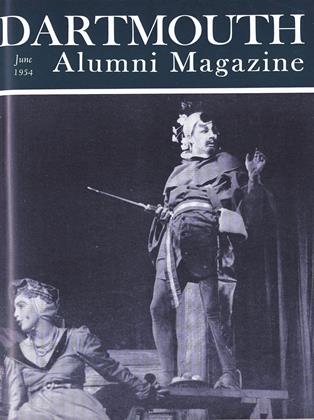He sat there calm as a Yogi On the broad granite shelf At the edge of the cellar hole Waiting, the day's work done, For the car that would take him home. Patient - the old turtle - patient As the cool stone beneath him Or the twisted lilacs at the wall's corner That mark the ancient homesite. Not yet one hundred years old, Yet eighty easily; the in-wrapped Gaze toward you, yet not upon you, or looking by You, or through you - as if you were invisible, And he meditating upon a thought Begun by grandsires - The kind of thought fat Brahmas Hold in that think-pouch between the eyes For a thousand dreamy years, As an old lady holds her peppermint lozenge Under her tongue. He lives so long by being sparing Of talk, nervous movements, or fidgets. He "mows out" close to house walls and barn Where the tractor mower can not reach While younger men harvest the open fields, Hand mowing to them a lost art. His scythe rides gently on the ground A short arc, back and forth, Seeming to swing by its own weight, He using no strength, except in slow shuffle, And the grass falls before the blade Almost as if frightened and untouched. The old man makes hard work seem easy And scorned drudgery a morning's pleasure. No one in our town, they say, Except the Old Man, knows how to mow Clean. No one wants to know; they are the new Machine men and curse the stubborn chores That won't be mechanized. But, What will the young men do When the Old Man goes? He the last who knows the forgotten arts? They go to him when they can't make Apple juice turn into vinegar, When it turns to bitter stuff instead. They ask him to find the boggy place on the Ridge Where the bulldozer can gnaw out a pond For the new fire truck to drink. Only the Old Man will know for sure Which bog bakes hard in August, Which holds gravel saturated with spring water The driest spell; he too can save the cow Menaced in calf birth; he can recall Where ran the boundary line between two angry farmers And they'd accept no other referee. He gives freely what he knows when asked, Yet asks nothing, nor shows surprise nor fears. The news that startles men - the Pearl Harbors - Makes them look fearful at each other, Disturbs not the neutralism of old age: Young men have hot emotions, Old men have cool thoughts. And his thoughts seem not of our world But are remote and cold as the North Star. He is among us but not of us, And when we need his secret wisdom, His knowledge of forgotten arts, We must recall him from where his mind Wanders in hill pastures, And every time it's harder to bring him back Or hold him till we get from him What we need to learn Of what the Old Man, only, knows. What will the young men do - When the Old Man goes?
The subject of this poem is a personality in Appleton, Maine, where Professor Files has a farm on which he will live the year around after his retirement this month as Professor of English at Tufts College. More of the "instinctual wisdom" of Down Easters was embodied in Professor Files' recent University Lecture on Learning Out of School, the substance of which the ALUMNI MAGAZINE hopes to print in a future issue.
 View Full Issue
View Full Issue
More From This Issue
-
 Feature
FeatureTHE EXPERIMENTAL THEATRE
June 1954 By HENRY B. WILLIAMS -
 Feature
FeatureNature Conditions Architecture
June 1954 By EDGAR H. HUNTER JR. '38, -
 Class Notes
Class Notes1918
June 1954 By ERNEST H. EARLEY, RICHARD A. HOLTON -
 Class Notes
Class Notes1926
June 1954 By HERBERT H. HARWOOD, ANDREW J. O'CONNOR, Richard Eberhart '26 -
 Article
ArticleThe Faculty
June 1954 By HAROLD L. BOND '42 -
 Class Notes
Class Notes1905
June 1954 By GEORGE W. PUTNAM, FLETCHER A. HATCH
Article
-
 Article
ArticlePLAYERS PLAN MUSICAL SHOW FOR CARNIVAL
January 1922 -
 Article
ArticleINTERESTING FIGURES GIVEN OUT ON SCHOLARSHIP OF 1927 CLASS
November, 1924 -
 Article
ArticleCollege Movies
APRIL 1930 -
 Article
ArticleMasthead
April 1981 -
 Article
ArticleFour club officers, two clubs, honored by College
November 1982 -
 Article
ArticleBallot Time
Nov - Dec

